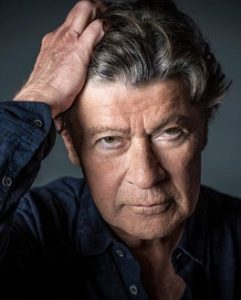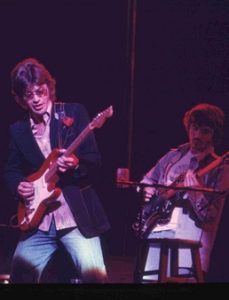Once Were Brothers: Robbie Robertson and The Band
 Robbie Robertson was about ten years old when his mother Dolly, raised on the Six Nations Reserve southwest of Toronto, bought him his first guitar. Robbie had always had an interest in music, and he took to the instrument immediately. Soon after learning to play, something magical happened – the dawn of rock ‘n’ roll. Young Robbie idolized rock pioneers like Chuck Berry, Little Richard, Carl Perkins, Fats Domino, and of course Elvis Presley. Robertson was intoxicated with the stripped-down musicality of the new style – the way the pianos sounded when the keys were pounded, the way the drums sounded when they were stricken, and the way the guitars sounded with reverb.
Robbie Robertson was about ten years old when his mother Dolly, raised on the Six Nations Reserve southwest of Toronto, bought him his first guitar. Robbie had always had an interest in music, and he took to the instrument immediately. Soon after learning to play, something magical happened – the dawn of rock ‘n’ roll. Young Robbie idolized rock pioneers like Chuck Berry, Little Richard, Carl Perkins, Fats Domino, and of course Elvis Presley. Robertson was intoxicated with the stripped-down musicality of the new style – the way the pianos sounded when the keys were pounded, the way the drums sounded when they were stricken, and the way the guitars sounded with reverb.
A musical revolution
Robertson knew he had to somehow be a part of this musical revolution. Fascinated with a local appearance by early rocker Ronnie Hawkins, Robertson began shadowing Hawkins around Toronto, and was eventually invited to become part of the road crew during the Canadian portion of his tour. One thing led to another, and next thing you know, Robertson is not only playing in Hawkins’ band, but he’s writing some of Hawkins’ songs – at just 15 years of age.
Robertson became friends with another member of Hawkins’ band, percussionist Levon Helm – like Hawkins, a native of Arkansas. In 1964, the band members (known as The Hawks) left Hawkins to tour alone. The Hawks concentrated more on blues and soul music rather than the rockabilly style Hawkins preferred. A year later, Bob Dylan tapped The Hawks as his back-up band for the tour in which he left behind his folk rock roots for a fully-electric sound. Dylan’s hardcore folk music fans were outraged, and the musicians were met with furious fans during and after every show.
Birth of The Band
After the Dylan experience, the band members bought a pink house in Woodstock, New York – yes, that Woodstock – turned the basement into a recording studio, and proceeded to cut one of the most influential albums in rock history, “Songs From the Big Pink.” By now, they had settled on a name for their group, The Band.
I’d say the rest is history, but for such a significant contributor to rock ‘n’ roll, many people are not familiar with the music of The Band. They recorded only a few albums, and they never reached the heights of popularity enjoyed by The Beatles, The Rolling Stones, and others. The sound of The Band has never been emulated, and their music is almost impossible to characterize. It’s been described as southern rock, country rock, roots rock, and everything in between. The Band featured five excellent musicians, and very few instrumental solos. Their songs were about the lyrics, the melodies, and the harmonies. Robertson wrote almost all their material, yet Helm served as lead singer on most of their songs.
New documentary
 Daniel Roher’s new documentary, “Once Were Brothers: Robbie Robertson and The Band” highlights the ups and downs of this authoritative music group – and tells their story through Robertson. It was a well-known fact that the once tight-knit group of musicians grew increasingly bitter toward one another as the years passed, and when they performed their final concert (displayed in Martin Scorsese’s excellent 1978 concert film “The Last Waltz”) the band members seemed relieved to have finally reached the end of their time together.
Daniel Roher’s new documentary, “Once Were Brothers: Robbie Robertson and The Band” highlights the ups and downs of this authoritative music group – and tells their story through Robertson. It was a well-known fact that the once tight-knit group of musicians grew increasingly bitter toward one another as the years passed, and when they performed their final concert (displayed in Martin Scorsese’s excellent 1978 concert film “The Last Waltz”) the band members seemed relieved to have finally reached the end of their time together.
Unfortunately, Robertson is the only surviving member of The Band. A couple of them passed away back in the 20th century. Levon Helm died in 2012, although segments from a late-in-life interview are sampled heavily here. Robertson appears to harbor very little ill will toward the other band members, and his one big complaint remains the heavy drug use by the other four.
Downfall at the hands of drugs
Drugs have been the downfall of many rock groups, and The Band was no exception. Robertson and his wife Dominique are not shy about presenting this portion of The Band’s history in all its stripped-down ugliness. It seems the young entertainers wrecked a lot of cars during their time in upstate New York. Robertson recalls being ready to record new material at 10:00 AM, while the other band members were still crashed out on the couch and the floor of the big pink house.
Robertson doesn’t say he never did drugs, but unlike the others, he stayed away from cocaine and heroin. Fortunately, Robertson had a wife and children during the time The Band was active – 1969 through 1974, primarily. Having a family to go home to every night likely kept Robertson away from the throes of the drug abuse experienced by the others.
Great film for fans
“Once Were Brothers” doesn’t shed a ton of new light on The Band itself; it’s more a documentary about Robertson. And that’s certainly not a knock on Roher’s film. Just don’t go in expecting a lot of new revelations. This is a waltz (pun intended) through the life of a great musician – one who followed his dreams, and now lives to tell about it. Robertson’s is a triumphant story, and “Once Were Brothers” focuses more on the celebrations than the heartaches. For the most part, it’s a good, fun viewing – albeit perhaps more for fans than for those unfamiliar with their work. This film is not likely to draw new fans to The Band, but it’s a treat and a joy for those of us who did enjoy their music.
Andy Ray’s reviews also appear on http://youarecurrent.com/category/nightandday/film-reviews/
and he serves as the radio film critic for https://lifestyleindy.com/radio/